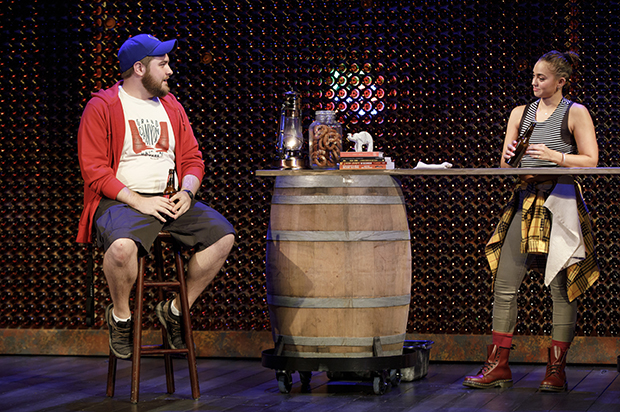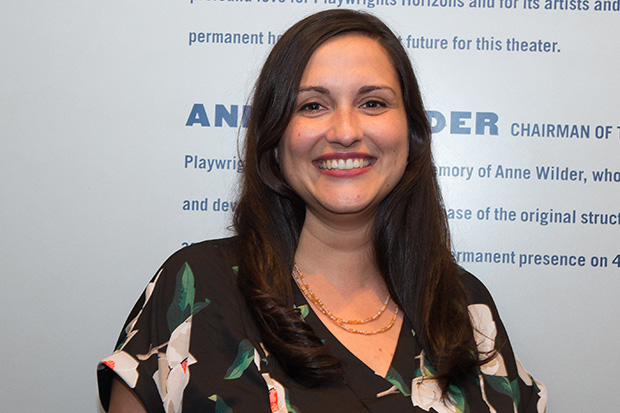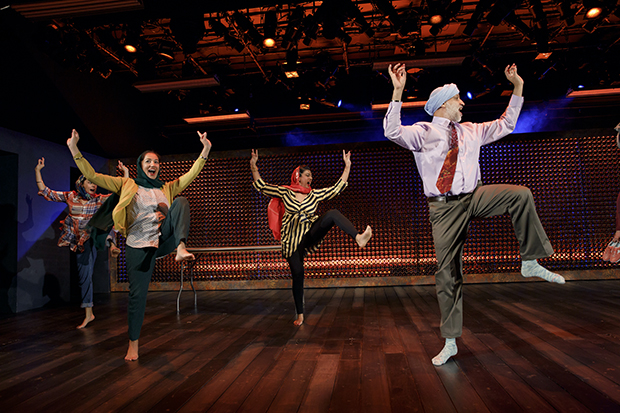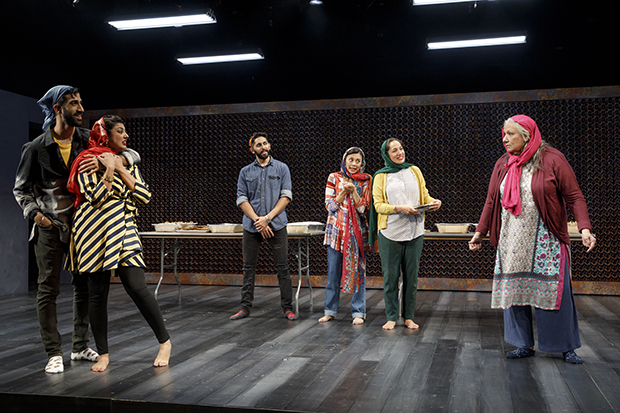Jaclyn Backhaus on Brewing Punjabi Identity Into the American Experience in India Pale Ale
The ”Men on Boats” author debuts her latest off-Broadway play with Manhattan Theatre Club.

(© Joan Marcus)
"I'm actually more of a wine person," Jaclyn Backhaus confesses as she slides onto a padded pew at As Is, a bar on 10th Avenue with an extensive beer selection. It's an admission that might surprise viewers of her latest play, India Pale Ale, a family drama in which a beer-stealing Punjabi pirate plays a pivotal role in family lore. Not much of a beer drinker myself, it was clear that we would both end up drinking the vino naranja.
Backhaus worked at several wine shops in New York until 2016 when her historical comedy, Men on Boats, played an acclaimed run with Clubbed Thumb at Playwrights Horizons. That show features an all-female case playing members of the 1869 Powell expedition of the Colorado River. Since 2016, it has been produced all across the United States, with upcoming productions in San Francisco and Seattle.
Backhaus brings her keen sense of history and its biases of omission to India Pale Ale, while also delivering a contemporary story about Boz, a Punjabi-American woman born, raised, and living in Raymond, Wisconsin. She has big plans to open a bar in Madison, but she hasn't worked up the courage to tell her family, who is deeply enmeshed in the town's small Sikh community.
Backhaus spoke about her own Punjabi roots and the political shifts in America that inspired her to write the play.

(© Allison Stock)
When did you start writing India Pale Ale?
I started writing some very early material in 2013, but I put it away for a long time because I didn't really think I was ready to write it. I picked it back up again after the inauguration in 2017 and the Muslim travel ban that seemed to go into place immediately after. I had heard instances of hate crimes and an "othering" of brown people was becoming OK again. I was very frustrated. That spurred me into action.
How much have you drawn from your own family in creating these characters?
The play is fictional, but the world and community of the play are based on my mom's side of the family. Most of her brothers and their immediate families live in a very tightknit Punjabi community in California. My mom's father came to the United States and settled in Yuba City in the early 20th century, and most of my cousins were born and raised there. The vibe of that community is what I used as my main inspiration for Raymond, Wisconsin.

(© Joan Marcus)
Would you go to the Sikh temple when you were there?
I would go to Langar [a communal meal] and Gurdwara [a Sikh temple]. My relationship to the Sikh religion is one of respect, but not practice. I will go back when I'm visiting my family. My mom's story is very interesting. When she met my dad, who is white, and decided to make her life with him, there was a bit of a falling out with her family. While I wasn't raised in the religion, I was raised with the option to take part in that culture. My mother kept my options very open because there were a lot of constraints on her.
In the play, Boz wants to bust out of her small town because she's realizing her own interests diverge in small ways from her community. Her family is ultimately very supportive. That's not something we typically encounter in stories about South Asian cultures. We're more likely to see an immigrant story, or a story of defying the family.
Do you find those stories of pushing against family expectations too simplistic?
I feel like other people have a better handle on that story, especially when we talk about the South Asian diaspora. In some ways it's like the beginning of the next generation of stories. We're on the cusp of understanding what it means to have South Asian culture baked into your Americanness —and what happens when those families run up against people who think they're not American. That story is more interesting for me to tell.

(© Joan Marcus)
The pivotal event of this play is based on an actual terrorist attack on a Sikh temple in Oak Creek, Wisconsin in 2012. Do you remember how you responded to that?
It was heartbreaking. I spoke to my mom that day, and while neither of us actively attends Gurdwara, it could have been our family had this happened in another place. A lot of what this show is trying to do is build bridges between people who feel they're so different from each other.
I love that your plays are grounded in history, especially the history that is skipped over in high school. How much research did you do into piracy around the East India Company?
In creating the character of Brown Beard, this family's pirate ancestor, I looked at the ship history of the East India Company, their routes, and what it was like to be a brown person on one of those ships. The jobs they were given were always very low deckhand positions. I was really interested in the idea of subverting the actual history of this family. Brown Beard is grand because his family has made him grand, not because he was grand in real life. A lot of my journey as an artist has been realizing that a lot of first-person accounts of history have been taken as objective fact. But what about all of the perspectives that were never recorded? History looks quite different when we approach it with the understanding that there's such subjectivity to it.








